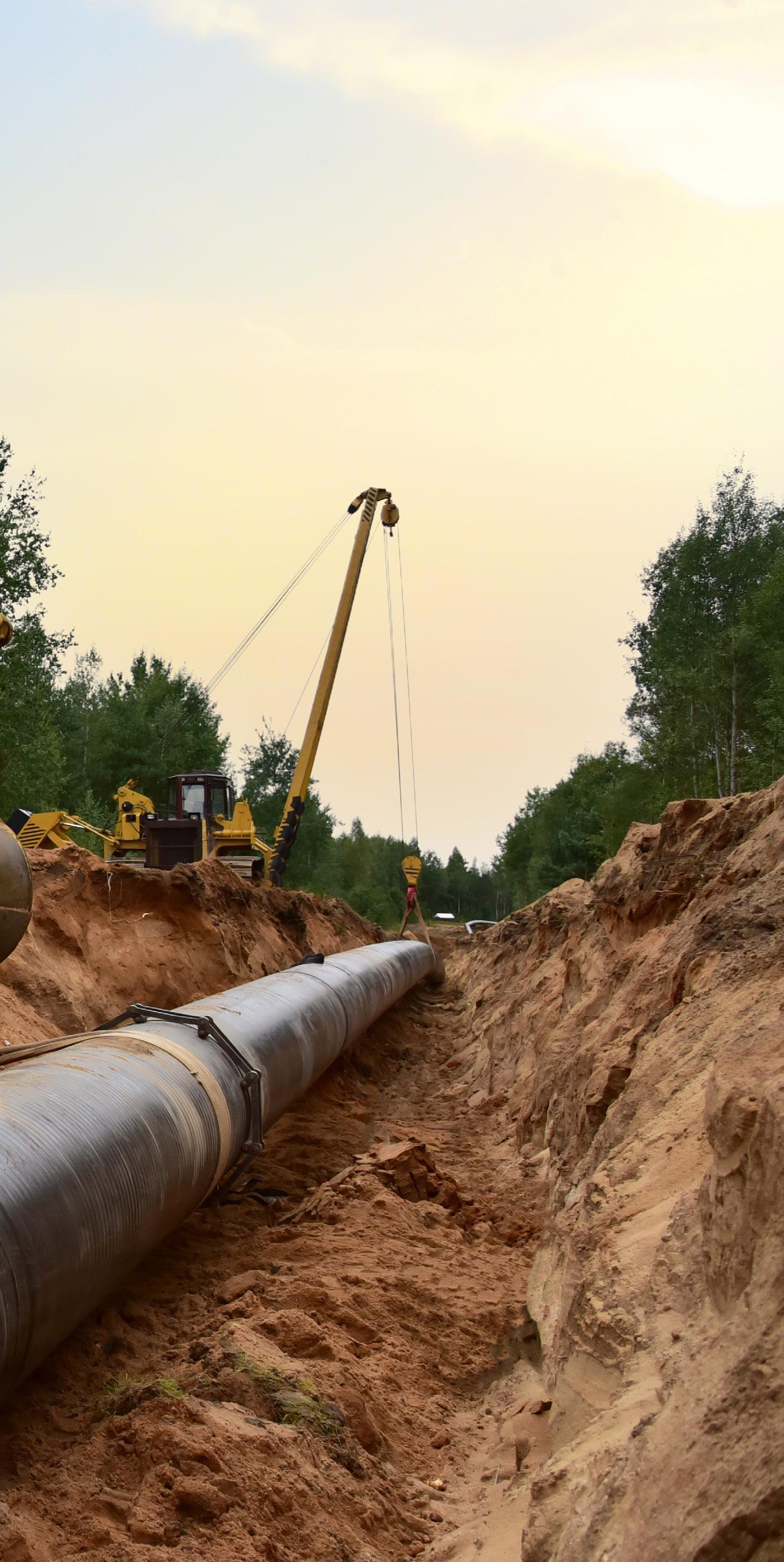
11 minute read
Pipeline news
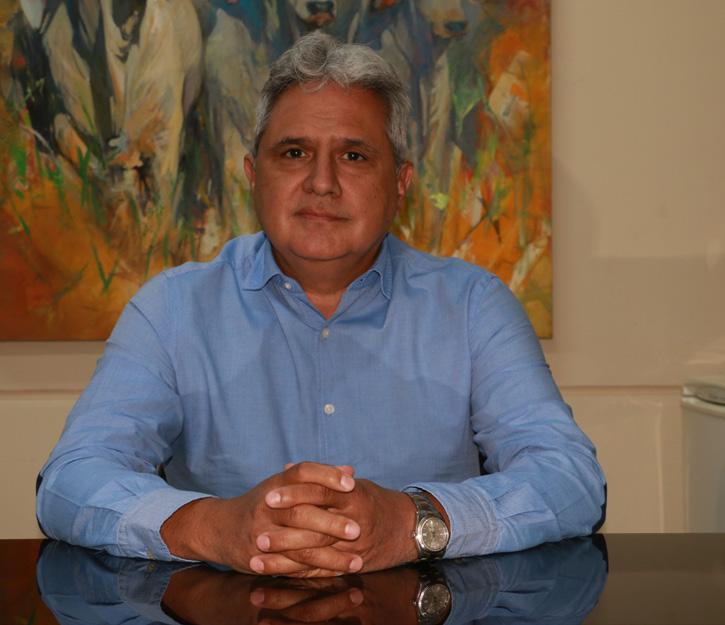
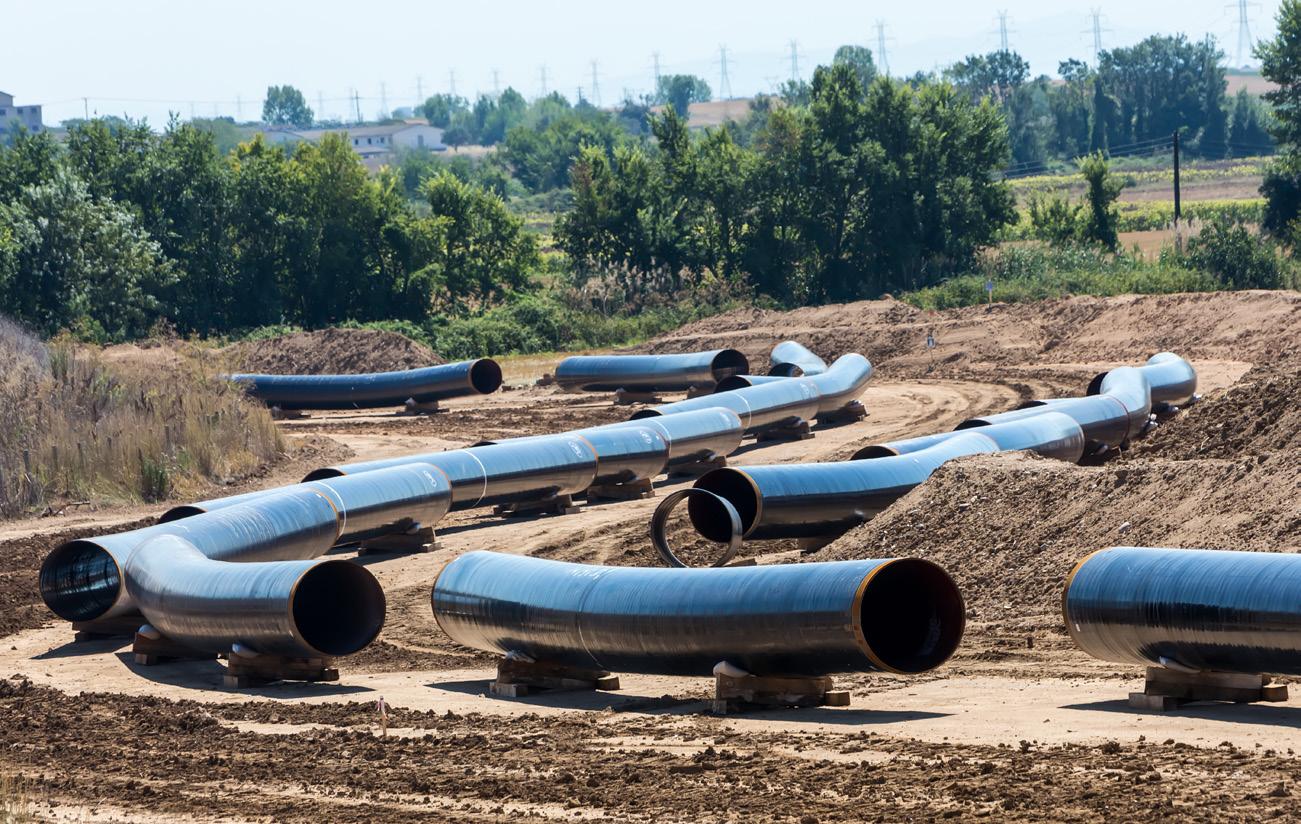
GUEST COMMENT
Gonzalo Montenegro CEO of SEPCON, Bolivia, Peru & Argentina IPLOCA President 2021 - 2022
The Bolivian natural gas reserves (28.6 trillon ft3 2002/10.7 trillon ft3 2017) have always attracted the presence of major industry players. Its strategic location, in the centre of Latin America, and its proximity to the biggest markets in the region (Brazil and Argentina) have enabled the development and construction of large pipeline systems that currently interconnect these three countries.
Both the Brazilian and Argentinian markets have been supplied with important volumes of Bolivian gas in recent decades (between January and October 2021, Bolivia exported 33.63 million m3/d to both markets), despite a decrease in production and exploration projects that put a strain on
the capability to meet export contracts.
In the last few months, a strategy to focus on the improvement of exportation and the production of gas was undertaken by the Bolivian government by its Oil and Gas Corporation (YPFB), which has enabled the development of key infrastructure to boost production and supply.
In order to better serve the incremental Argentinian market demand, new natural gas reserves were injected into the system by rapidly developing a connection of wells and enhancing the central processing capabilities of the Incahuasi and MargaritaHuacaya gasfields.
The contribution from the private sector was key in this regard. In 2018, Total Energies as the operator worked with SEPCON as the contractor in the Incahuasi conventional gas field. The successful implementation of the pipeline interconnection of the Incahuasi 3 and 5 wells, and the enhancement of the Incahuasi Plant, increased capacity from 7.2 to 11 million m3/d.
In recent months, Repsol’s exploration and drilling activities, as the operator of the Margarita-Huacaya gasfield, and SEPCON as the construction company, have successfully achieved a rapid integration and interconnection of the Margarita 10 well and the Boicobo X1 well to the Margarita Gas Plant. This incorporates an additional volume of 3 million m3/d of natural gas to meet the export commitments.
These important strategic achievements are without a doubt a major shift, and generate a boost in new feasibilities and capabilities that will sustain the incremental gas flow via the Brazil-Argentina-Bolivia interconnections.
Gonzalo Montenegro is the IPLOCA President for the term 2021 - 2022. IPLOCA represents over 240 key players in the onshore and offshore pipeline construction industry worldwide. IPLOCA’s mission is to provide value to members through a forum for retaining and sharing knowledge globally, facilitating business opportunities, and promoting the highest standards in safety, innovation, quality, business ethics, and sustainability throughout the pipeline construction industry. www.iploca.com

WORLD NEWS
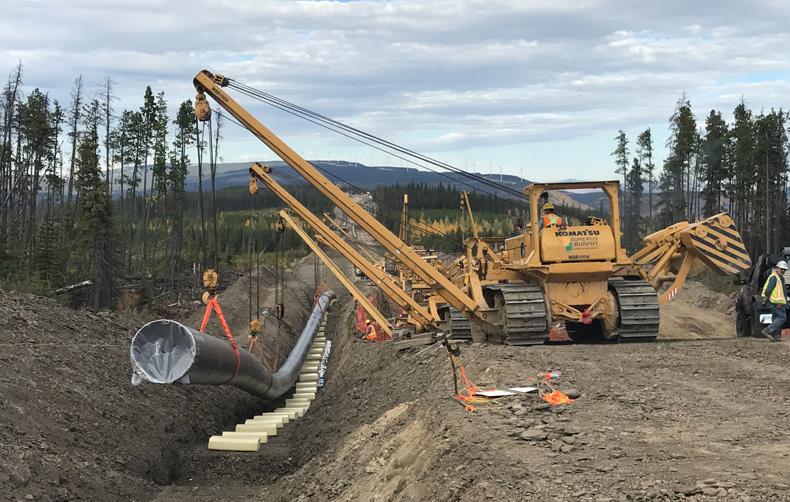
ILF and DORIS support strategic gas pipeline from Nigeria to Morocco
The consortium consisting of NNPC (Nigerian National Petroleum Corporation), Nigeria and ONHYM (Office National Des Hydrocarbures et Des Mines), Morocco, is progressing with the plans for its mega-project Nigeria-Morocco Gas Pipeline (NMGP).
The NMGP, an onshore and offshore gas pipeline crossing the land and/or waters of 16 countries along the Atlantic coast, shall bring Nigerian gas to North Africa and extend to Spain for the European market. The pipeline will also provide a new avenue for the countries along the route to export/import gas to/from their neighbouring countries and Europe.
ILF Consulting Engineers (ILF) with its office in Munich, Germany, together with its Joint Venture Partner DORIS Engineering (DORIS) located in Paris, France, is delighted to have been commissioned to carry out the Project Management Consultancy (PMC) services for the FEED Phase II of this project. ILF and DORIS can make use of their combined expertise in the respective fields of competence and provide a fundamental support to ONHYM and NNPC in the delivery of this strategically important project.
The PMC services provided by ILF and DORIS cover the Onshore and Offshore Pipeline and Compressor Station Engineering, the Engineering Surveys, the Environmental and Social Impact Assessment (ESIA) and Land Acquisition (LAS) Studies and the Project Implementation Framework. The project explores the potential to use renewable energy resources to power the pipeline and reduce the project’s carbon footprint.
“With ILF having already been part of the Feasibility Phase and FEED Phase I of this world-scale project, the award of Phase II to us is an evidence of trust by our long term Clients ONHYM and NNPC in our Project Management Excellence and Reliability in delivering world class projects.” said Carles Giro, Area Manager Industrial Plants of ILF. “DORIS has always demonstrated a great value in complex projects both in terms of safety and cost optimisation. While ONHYM and NNPC are moving one step further in their ambition of bringing alive this mega project, DORIS is delighted to leverage its decades of expertise in offshore developments to support the project in achieving its main objectives: responding to the highest environmental and safety requirements while ensuring the best technico-economic solutions are selected” said Francis Carmigniani, DORIS Engineering Managing Director. When completed, the over 6000 km long gas pipeline will be the longest offshore pipeline in the world and the second longest pipeline at all. It has a planned diameter of 48 in. offshore and 56 in. onshore, with a planned throughput of 30 billion m3/yr. With involving sixteen countries, the pipeline will not only supply the local markets with a sustainable and reliable energy source, it shall also support industrial and economical development, create a competitive regional power market and benefit all West African people, countries, and their economies. Nigeria, an OPEC member, has the largest gas reserves in Africa and the seventh-largest in the world. The project falls in line with the ‘Decade of Gas Master Plan’ that Nigeria’s President Muhammadu Buhari launched in 2020. On the Moroccan side, this landmark project is part of the South-South cooperation upheld by King Mohammed VI.
Permian Highway Pipeline announces final investment decision
Permian Highway Pipeline, LLC (PHP) has announced a final investment decision (FID) to proceed with its expansion project after securing binding firm transportation agreements for all available capacity.
The project will increase PHP’s capacity by approximately 550 million ft3/d. The project will involve primarily additional compression on PHP to increase natural gas deliveries from the Waha area to multiple mainline connections, Katy, Texas, and various US Gulf Coast markets. Pending the timely receipt of required approvals, the target in-service date for the project is anticipated to be 1 November 2023.
“We are excited to have achieved FID on this very important expansion,” said Kinder Morgan Natural Gas Midstream President, Sital Mody. “The project will alleviate transportation constraints out of the Permian Basin so as to further support meeting our domestic and global energy needs.” “This expansion couldn’t come at a more critical time, as it will foster future natural gas production growth in West Texas and provide several liquefaction facilities along the Texas Gulf Coast with more affordable, reliable supply,” said Jamie Welch, President and CEO of Kinetik. “In addition, approximately 30 of Kinetik’s customers will gain access to premium priced markets and transportation flow assurance, which is critical to minimising flared volumes.” PHP is jointly owned by subsidiaries of Kinder Morgan, Inc., Kinetik Holdings Inc. and ExxonMobil, with an ownership interest of 26.7%, 53.3% and 20%, respectively.
Tellurian awards Baker Hughes contract for electric-powered compressor technology
Tellurian Inc. and Baker Hughes have announced that Baker Hughes has been awarded a contract by Driftwood Pipeline LLC, a subsidiary of Tellurian Inc., to provide electric-powered Integrated Compressor Line (ICL) technology and turbomachinery equipment for Lines 200 and 300, a natural gas transmission project, proposed to be located in Beauregard and Calcasieu Parishes, in southwest Louisiana.
Joey Mahmoud, President of Tellurian Pipelines, added, “We anticipate the project will supply upwards of five and one-half billion ft3/d of natural gas, with virtually no emissions. Tellurian is doing its part by making this initial US$240 million pipeline investment as part of the broader Driftwood Pipeline system which will provide enhanced supply reliability to meet the area’s projected industrial growth in a cleaner, more sustainable manner.”
IN BRIEF
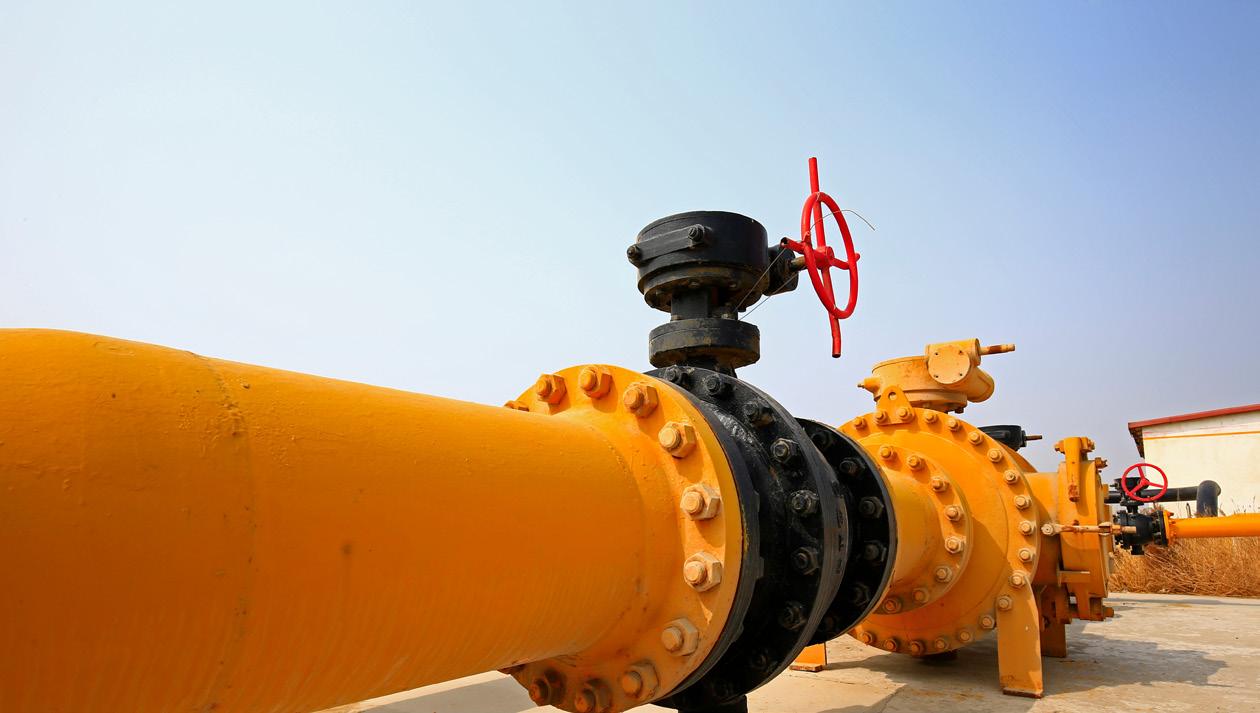
As of 3 June 2022, pipeline companies completed two crude oil pipeline projects in the US, according to the EIA’s recently updated Liquids Pipeline Projects Database. No new hydrocarbon gas liquids or petroleum product pipeline projects were completed in the first five months of 2022.
TÜV SÜD National Engineering Laboratory is calling upon businesses within the oil and gas industry to take advantage of funding offered by Innovate UK as part of its Analysis for Innovators (A4I) programme. The next competition for grant funding opens in August 2022, with a second opportunity expected in November.
Accenture is using a proprietary database powered by artificial intelligence (AI) to help Colonial Pipeline, the largest refined products pipeline in the US, reduce regulated and deregulated electric utility rates for its interstate pipeline system.
FRANCE
Schneider Electric has announced it has won the Energy & Sustainability 2022 Microsoft Partner of the Year Award.
Emerson announced its sustainability strategy to achieve net-zero greenhouse gas Scope 1, Scope 2 and Scope 3 emissions by 2045. The company detailed its goal to reach net-zero and its environmental, social and governance progress in its 2021 ESG report.
SCF Partners and T.D. Williamson, Inc. have announced an investment partnership.
WORLD NEWS
Milestones reached for Trans-Saharan gas pipeline project
The Ministry of Petroleum of the Republic of Niger has announced that the country has reached a new milestone in further opening the domestic and regional gas market through a development in the construction of the multi-billion Trans-Saharan gas pipeline (TSGP) alongside Algeria and Nigeria.
H.E. Mahamane Sani Mahamadou, Minister of Petroleum for the Republic of Niger, met with H.E. Mohamed Arkab, Minister of Energy and Mines, Algeria, and H.E. Chief Timipre Sylva, Minister of State for Petroleum Resources of Nigeria as well as the Director Generals of NOCs of the three African countries met to discuss the implementation of the TSGP on 20 June 2022, in Abuja. During the meeting – which follows the signing of the ‘Niamey Declaration’ during the 3rd Forum of the Economic Community of West African States in February 2022 – parties established a taskforce and roadmap for the development of the TSGP.
A Steering Committee will be responsible for updating the feasibility study for TSGP, and will meet at the end of July 2022 in Algiers to discuss how to progress with the TSGP project.
With energy poverty increasing across the African continent due to limited investments in energy projects, delays in exploration, production and infrastructure rollout, the COVID-19 pandemic and global energy transition-related policies, the TSGP project will bring in a new era of energy reliability for Africa. With the 4128 km pipeline running from Warri in Nigeria to Hassi R’Mel in Algeria via Niger, the pipeline will not only create a direct connection between Nigeria and Algeria’s gas fields to European markets, but will bring significant benefits for Niger. With over 34 billion m3 of gas, Niger, in its own right, has the potential to become a gas exporter, and with Europe expanding energy ties with Africa, the TSGP project will mark a new era of improved regional cooperation in Africa, enhancing gas monetisation and exports while scaling up Niger-exports to Europe via Algeria. Meanwhile, with the pipeline making headway, opportunities for the country to increase domestic gas utilisation on the back of new reserves from Niger and Nigeria have arisen. With Niger seeking to improve electricity access and ensure energy affordability through increased exploitation of gas, the TSGP initiative will be a game changer. The pipeline will enable up to 30 billion m3 of natural gas to be traded yearly, enhancing regional and international energy trade, enabling Niger to expand the role of natural gas in its energy mix, and address energy poverty. Sebastian Wagner, Executive Chair of the Germany Africa Business Forum, said, “What we want to see is African financiers rallying towards supporting the rollout of TSGP. Increased oil and gas exploration, production and assets development is what will bring Africa out of energy poverty by 2030.”
DNV collaborates on hydrogen with Pipeline Infrastructure Ltd
DNV is providing technical advice and support to Pipeline Infrastructure Limited (PIL) on the integration of blended hydrogen into its gas trunkline assets in India – including transmission pipelines, interconnects and spur lines, compressor, valve, and metering stations and equipment.
PIL’s initiative is one of the first hydrogen blended related projects in the transmission space in India, aligned with the government’s launch of India’s National Hydrogen Mission in August 2021, targeting 5 million tpy of hydrogen production by 2030. In conjunction with fiscal support and other incentives, the Mission aims to leverage the nation’s significant renewable energy potential to transform India into a green hydrogen hub, help meet national climate goals and enable India to become a major producer and exporter of hydrogen to Japan, South Korea, and Europe. According to DNV’s Energy Transition Outlook 2021, demand for hydrogen in the Indian subcontinent will reach nearly 25 million tpy by 2050, primarily for ammonia production, transportation, and refining.










